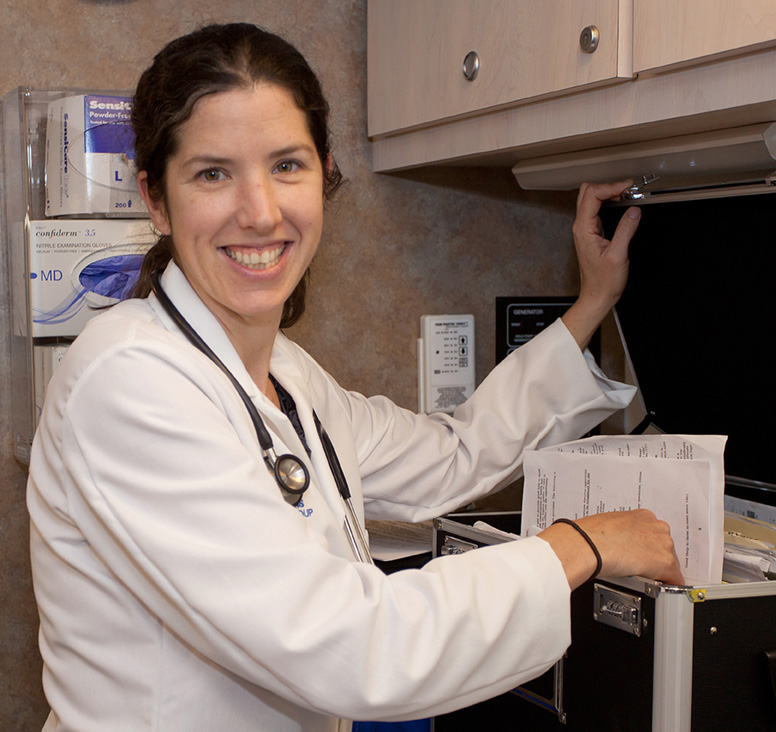Medical Director, Bon Secours Care-A-Van
Good Deeds
Honoring physicians who are doing community service locally or outside the state or nation.
 The statistics are unsettling: according to a June 2015 report posted on Virginia.gov, nearly a million Virginians still lack health insurance. In Hampton Roads, almost 15 percent of all residents under the age of 65 are among the uninsured – a population of 240,000. Many of these are children, and many are overweight or obese adults. Without insurance, vaperforms.virginia.gov states, citizens often are unable to pay for the medical care they need and frequently forego preventive measures that would make that care unnecessary.
The statistics are unsettling: according to a June 2015 report posted on Virginia.gov, nearly a million Virginians still lack health insurance. In Hampton Roads, almost 15 percent of all residents under the age of 65 are among the uninsured – a population of 240,000. Many of these are children, and many are overweight or obese adults. Without insurance, vaperforms.virginia.gov states, citizens often are unable to pay for the medical care they need and frequently forego preventive measures that would make that care unnecessary.
In four cities throughout Hampton Roads, one Bon Secours physician is leading a program that reaches out to these citizens, providing medical care and treatment to those unable to pay for it. Emily Lieb, MD, a Board certified family medicine physician, is Medical Director of the Bon Secours Care-A-Van, overseeing a staff of physicians, a nurse practitioner, a registered nurse and patient navigator, a licensed practical nurse and Spanish speaking interpreter, and others. The Care-A-Van is a mobile health care clinic that collaborates with community partners, including free clinics, local health agencies, and numerous faith-based community organizations, to provide free medical services to those in need.
Dr. Lieb, a graduate of the University of Virginia School of Medicine, practiced family medicine in Charlottesville, and later worked in urgent care until she and her husband, Dr. David Lieb, an endocrinologist with EVMS, settled in Hampton Roads. It was after their three children were born that her neighbor, the previous medical director of the Care-A-Van, asked if she’d be interested in taking over. “We’d known each other at UVA,” Dr. Lieb says, “and we had worked together at a migrant farmers’ camp. I took a few days to think about it, but I knew it was the right fit for me.”
The Care-A-Van visits locations throughout Newport News, Norfolk, Portsmouth and Suffolk – all cities that house a Bon Secours hospital. No one is asked to pay, and with few exceptions, no one is turned away (the exceptions: those who have primary care physicians, have Medicaid, or arrive late when the clinic is full). There is no geographical limitation: patients come from as far away as North Carolina and Western Tidewater to receive care.
These patients have any number of challenges: they are uninsured, they have transportation barriers, they come from unstable living conditions, they have received fragmented care, and they often have very limited health literacy. Some are students, some are jobless, some are immigrants and some are indigent. All are in need of medical care, and all lack the resources to pay for it.
“We serve 12 different locations throughout our service area,” Dr. Lieb says, “in an attempt to reach as many as possible. Often we partner with churches, which post our monthly calendar and offer us the use of their meeting rooms to see patients.” Many patients come to the Van through word of mouth, referral from social services, or upon discharge from jail.
The Care-A-Van provides lab services, EKGs, PAP smears, minor procedures, flu shots, and, as Dr. Lieb says, “Just about anything you’d see your family doctor for, we can do on the Van.” If a patient’s presentation is beyond the Van’s capabilities, she will arrange for hospital care, even calling an ambulance for transport, if indicated.
While the majority of the patients are seen for management of chronic diseases, Dr. Lieb has diagnosed stroke, patients with cardiac chest pain, even cancer. There are often twenty or more patients a day, and if there are two providers on the Van, they can see even more.
Last year, Dr. Lieb says, the Care-A-Van treated 4,125 people. She expects that many or more this year.

